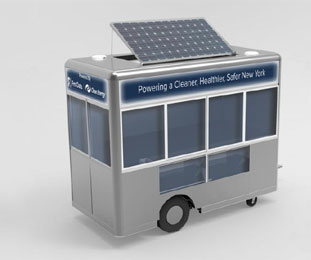Food carts are ubiquitous on the streets of New York City, where you can buy anything from knishes to falafels, and even they are getting an environmental upgrade.
About 8,000 food carts serve an estimated 1.2 million food transactions each day.
Under a pilot program, 500 environmentally superior food carts will be provided to vendors across the city. They will greatly reduce pollution, increase safety for vendors and the public and provide the kitchen needed for clean food preparation.
Currently, food carts run on dirty, noisy diesel generators and/or propane, producing lots of greenhouse gas emissions, nitrogen oxide, particulate matter and carbon monoxide, not to mention leaks and explosions from using propane. High energy and maintenance costs can result in inadequate food refrigeration and cart ventilation, which can lead to spoiled food and other health concerns.

MOVE Systems unique food cart combines a restaurant-grade kitchen with refrigeration that runs on a combination of solar, a battery and compressed natural gas (CNG). A hybrid controller determines if the cart’s energy demand can be met by the battery alone, and vendors will be able to charge the battery at electric car charging stations across the city.
The result: greenhouse gas emissions reduced 60% and smog-causing nitrogen-oxide pollution, 95%.
Even better, in the future it could run on biogas.
"This innovative cart also opens the door for true closed-loop operations in the mobile food industry," says Energy Vision, which conducted the analysis. "As New York City implements its ambitious waste reduction and recycling plans, an immense opportunity exists to collect and process food waste generated by mobile vendors and NYC as a whole – to produce an ultra-low carbon source of fuel/energy known as renewable natural gas [biogas].
Read our article, New York City Takes On Climate Change & Income Inequality.
Learn more:
